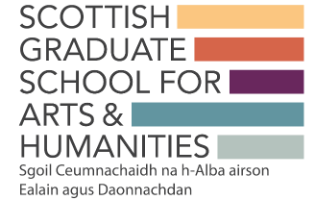Heritage, Conflict and Postgraduate Research: The Role of the Invisible University of Ukraine
Published: 30 May 2023
The Invisible University of Ukraine is a certificate programme delivered by the Central European University and echoes various twentieth century underground and exile educational initiatives. The programme supports students from Ukraine whose studies have been disrupted by war. In this workshop, attendees will have the opportunity to hear about the first-hand experiences of those involved.
Monday 19th of June
10am - 12.30pm
This event has been organised by Siân Jones, Professor of Heritage at the University of Stirling, and co-lead of SGSAH Heritage Hub, in collaboration with Dr Diána Vonnák (Postdoctoral Research Fellow, University of Stirling).
About this seminar/panel discussion
War changes heritage research and the lives and careers of young professionals in the field. Russia’s invasion of Ukraine displaced postgraduate students and young researchers, while others continue their work under huge pressures. Transnational educational initiatives sprang up to support Ukrainian students and researchers in this period, hoping to lessen ruptures caused by war, and to build networks of solidarity.
The Invisible University of Ukraine is a certificate programme delivered by the Central European University and echoes various twentieth century underground and exile educational initiatives. The programme supports undergraduate and postgraduate students from Ukraine whose studies have been disrupted by war, by providing “an intensive learning experience on the role of Ukraine in changing European and global contexts, placing questions relevant for Ukrainian students into a transnational comparative perspective”. The educational programme comprises online thematic modules, mentoring, skill-building and career development.
In this workshop, attendees will have the opportunity to hear about the first-hand experiences of those involved. Dr Diána Vonnák will introduce the IUFU prgramme and talk about her role in teaching and mentoring, whilst Polina Baitsym and Oleksandra Ivanova will talk about their experiences of postgraduate studies against the backdrop of the war and the role of an IUFU in providing the basis for research projects on heritage and conflict. They will discuss their ongoing research projects on Soviet monumental art and on emergency monitoring archaeological sites in Northern Ukraine, respectively. The event will finish with a panel discussion focusing on the impact of war on postgraduate research and the role of transnational solidarity in education using the example of The Invisible University of Ukraine.
Learning Outcomes
By the end of this session, participants will have gained:
- A knowledge of how heritage is caught up in the conflict in Ukraine from two student projects
- An understanding of how war changes heritage research and the lives and careers of young professionals in the field
- Reflection on the role of transnational educational initiatives in lessening the ruptures caused by war and building networks of solidarity
Biographies
Dr Diána Vonnák is a heritage scholar trained in social anthropology. Her work focuses on how heritage institutions and professionals work in contexts of crisis, armed conflict and rapid political change. She is interested in the changing division of labour between states, international actors and different non-state actors in negotiating the recognition, management and protection of heritage; in the afterlife of political projects and the public negotiation of state collapse, independence and the dissolution of empires.
Since 2014, she has been working predominantly in Ukraine, and she is part of the University of Stirling DECOPE project team focusing on care for heritage in the context of the war. Prior to joining Stirling in 2023, she was a teaching fellow in public anthropology at UCL, then a postdoctoral researcher at the Russian department at the University of St Andrews. She is an affiliate researcher at the Centre for the Urban History of East-Central Europe, a research NGO in Lviv. She is also a member of Invisible University of Ukraine.
Oleksandra Ivanova is a former postgraduate student at the Department of Archaeology and Museology of Taras Shevchenko National University of Kyiv. Since the outbreak of war she has also been involved in the Invisible University of Ukraine.
Oleksandra's work concerns protection and preservation of archaeological heritage during military conflicts, focusing on how heritage was protected during wars in other countries and how this experience can be used in Ukraine. She is a member of the Archaeological Landscapes Monitoring Group team, the aim of which is to protect, monitor and publish information on damage and destruction of archaeological heritage.
Polina Baitsym – Polina Baitsym is an art historian and curator specializing in the history of Ukrainian Soviet visual arts. Currently, she is a PhD Candidate in Comparative History at Central European University (Budapest, Hungary/Vienna, Austria) and curator of the Museum of Contemporary Art NGO (MOCA) Library, Kyiv, Ukraine.
In 2018, Baitsym launched a research initiative dedicated to Ukrainian children’s illustration of the 1960-1990s, within which she curated two exhibitions in 2019. In 2020, she issued a book on Ukrainian Soviet mosaics Art for Architecture. Ukraine. Soviet Modernist Mosaics from 1960 to 1990 (Berlin: DOM Publishers, 2020), co-written with a documentary photographer Yevgen Nikiforov. She was a Visiting Fellow at The Institute for Human Sciences (IWM) and at the Institute of Fine Arts (IBK) at the Academy of Fine Arts in Vienna, Austria. Recently, Baitsym co-curated Ukrainian contribution to an exhibition Retrotopia. Design for Socialist Spaces at Kunstgewerbemuseum, Berlin, Germany.
Event contact: sian.jones@stir.ac.uk
First published: 30 May 2023



